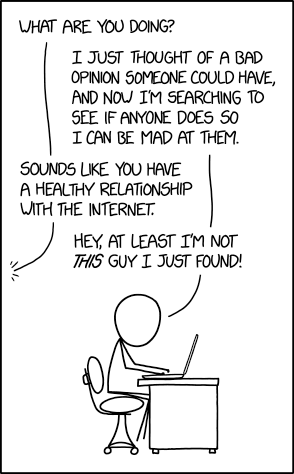Difference between revisions of "2051: Bad Opinions"
m (→Transcript) |
(Reorganized explanation and increased neutrality) |
||
| Line 9: | Line 9: | ||
==Explanation== | ==Explanation== | ||
{{incomplete|Explain xkcd seeks to be a neutral source of information; as such, it should be treated like one. Do NOT delete this tag too soon.}} | {{incomplete|Explain xkcd seeks to be a neutral source of information; as such, it should be treated like one. Do NOT delete this tag too soon.}} | ||
| − | [[Cueball]] | + | [[Cueball]] is imagining bad opinions, searching them up on the Internet, and excoriating people holding said opinions. |
| − | + | In title text he goes further, where he can't find an opinion he imagined on the internet, but still wants to discredit it, just because he is so infuriated by just being able to imagine it. This is similar to {{w|Straw man|straw man argument}}, where someone refutes an argument that wasn't actually made by anyone. | |
| − | + | If Cueball wasn't thinking of all these bad opinions, nobody else would have brought them to his attention, and he wouldn't have an opportunity to argue against them. The fact that Cueball is the cause of his own agitation is the joke of the comic (or perhaps, the sad part of the comic). | |
| − | + | Ironically, the comic itself could be considered an example of this behavior. It is possible that Randall imagined the absurd person and behavior depicted in the comic, and wrote a comic satirizing it, without knowing if such a person actually exists. | |
| − | + | The [[1974: Conversational Dynamics|unhealthy conversation habits]] enabled by the [[181: Interblag|Interblag]] has been a regular theme in xkcd. In fact, this is a rather obvious callback to one of the most popular xkcd comics, [[386: Duty Calls]], wherein Cueball is actively seeking to discredit and correct people who are "wrong" on the internet. | |
==Transcript== | ==Transcript== | ||
Revision as of 21:09, 26 September 2018
Explanation
| |
This explanation may be incomplete or incorrect: Explain xkcd seeks to be a neutral source of information; as such, it should be treated like one. Do NOT delete this tag too soon. If you can address this issue, please edit the page! Thanks. |
In title text he goes further, where he can't find an opinion he imagined on the internet, but still wants to discredit it, just because he is so infuriated by just being able to imagine it. This is similar to straw man argument, where someone refutes an argument that wasn't actually made by anyone.
If Cueball wasn't thinking of all these bad opinions, nobody else would have brought them to his attention, and he wouldn't have an opportunity to argue against them. The fact that Cueball is the cause of his own agitation is the joke of the comic (or perhaps, the sad part of the comic).
Ironically, the comic itself could be considered an example of this behavior. It is possible that Randall imagined the absurd person and behavior depicted in the comic, and wrote a comic satirizing it, without knowing if such a person actually exists.
The unhealthy conversation habits enabled by the Interblag has been a regular theme in xkcd. In fact, this is a rather obvious callback to one of the most popular xkcd comics, 386: Duty Calls, wherein Cueball is actively seeking to discredit and correct people who are "wrong" on the internet.
Transcript
- [Cueball sits at a laptop.]
- Offscreen voice: What are you doing?
- Cueball: I just thought of a bad opinion someone could have, and now I'm searching to see if anyone does so I can be mad at them.
- Offscreen voice: Sounds like you have a healthy relationship with the internet.
- Cueball: Hey, at least I'm not this guy I just found!
Discussion
just did my first transcript, hope its good :) Nintendo Mc (talk) 15:14, 26 September 2018 (UTC)
Same whoops -Welp 172.68.47.144 (talk) (please sign your comments with ~~~~)
How the heck do you "violently express your opinion" in a non-physical medium? Seems like the logic of someone who is looking for an excuse to retaliate with actual violence. Andyd273 (talk) 15:41, 26 September 2018 (UTC)
- You realize that literally punching a person is not the only form of aggression and abuse? The internet is still connected to real world and things done there can have consequences. 172.69.190.10 21:22, 26 September 2018 (UTC)
- Violence is not just aggression or abuse. You can be aggressive or abusive over the Internet, but the recent trend to start calling more things “violence” makes the word less useful. Yes, Internet abuse can be harmful, but it would be even more harmful if it had the potential to come with physical injury and a medical bill in extreme cases. 172.68.189.19 07:13, 27 September 2018 (UTC)
Cough Me and the Flat Earth Society. That's right, Jacky720 just signed this (talk | contribs) 15:44, 26 September 2018 (UTC)
This is clearly a reference to 386:_Duty_Calls. The chair is the same. Cueball's posture is the same. The desk is the same. The subject matter is roughly the same. The monitor and keyboard are now a laptop. Cueball's unhealthy obsession (which is still relatable to many) has become insanity.KDulcimer (talk) 17:23, 26 September 2018 (UTC)
I think this comic is primarily commenting on the phenomenon of outrage addiction (relevant: Psychology Today: "Is Our Political Outrage Addictive?", World Magazine: "Online outrage addiction", Quartz: "How Americans can break their outrage addiction"). Ahiijny (talk) 20:26, 26 September 2018 (UTC)

